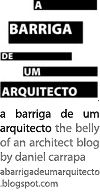Not even the truth will set them free
Published Tuesday, April 13, 2010.
Michael Specter’s presentation on TED – The Danger of Science Denial – is a fascinating reflection on the many ways in which our society is becoming unscientific. It’s a good introduction to some of the ideas explored in his book Denialism, examining the many ways in which people are rejecting knowledge supported by scientific data to embrace what often seem to be comfortable fictions. As an example, Michael brings forth the debate between organic versus genetically modified food, and how it has become a purely rhetorical debate of ideological outlines having nothing to do with science. And this I find really interesting because I believe has correlation with what’s happening with sustainability regarding many fields of knowledge, architecture included, and how it’s also establishing itself as an ideology, propped up by design trends the likes of green rhetoric, and not as the subject of scientific investigation based on quantifiable data.
Another interesting notion brought up on his presentation is our negative notion of progress which reflects our common disbelief for institutions and dread for the corporate world. This may be justifiable in many ways, but has also triggered our society into becoming one of the most conservative in human history. Why is it that we have such a deep ambivalence towards progress, towards change? Why is it that we often express such a strong disbelief for ourselves? Michael Specter brings forth some powerful questions, remembering us that we’re entitled to our beliefs, to our fears, but we’re not entitled to our own facts. And if we’re not searching for knowledge, based on truthful observation, on causality and correlation, then, as he eloquently puts it, not even the truth will set us free.
Another interesting notion brought up on his presentation is our negative notion of progress which reflects our common disbelief for institutions and dread for the corporate world. This may be justifiable in many ways, but has also triggered our society into becoming one of the most conservative in human history. Why is it that we have such a deep ambivalence towards progress, towards change? Why is it that we often express such a strong disbelief for ourselves? Michael Specter brings forth some powerful questions, remembering us that we’re entitled to our beliefs, to our fears, but we’re not entitled to our own facts. And if we’re not searching for knowledge, based on truthful observation, on causality and correlation, then, as he eloquently puts it, not even the truth will set us free.
ENGLISH EDITION
The English-only edition of the blog A Barriga de um Arquitecto is no longer being updated. Please visit the main page to access new content, additional information and links.
ARCHIVES | ARQUIVO
September 2008 October 2008 November 2008 December 2008 January 2009 February 2009 March 2009 April 2009 May 2009 June 2009 July 2009 August 2009 September 2009 October 2009 November 2009 December 2009 January 2010 February 2010 March 2010 April 2010 May 2010 June 2010 July 2010 August 2010 November 2010 January 2011 February 2011 March 2011 June 2011 July 2011 October 2011 December 2011
